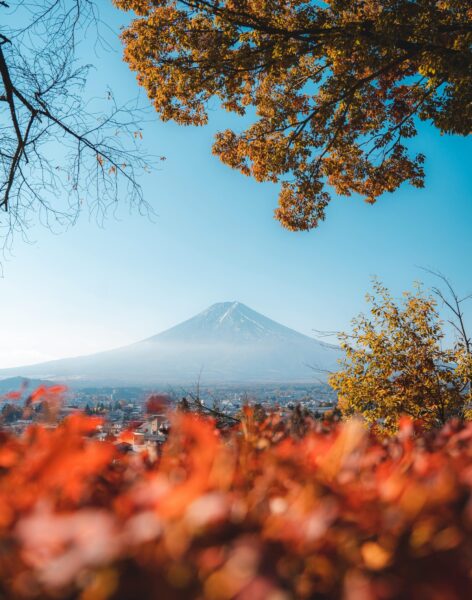-
in·spire /inˈspī(ə)r/: arouse, animate, imbue with spirit, give rise to, possessing extraordinary quality as if arising from an external creative impulse, to breathe in
According to Classical Chinese symbolism, autumn is associated with the energetic qualities of the metal element 金 (jīn) and the Lung organ network. This means that the energetic gestures behind these facets are practically synonymous.
Metal corresponds to anything in nature with an internalized structure: the rocks beneath a river that set the foundation for how the water flows, the minerals found in soil, gemstones, and actual metals like silver or copper. The character for metal 金 can also be translated as gold, money, or something that is highly valued.
Mountainous regions align with the quality of the metal element. As if sitting atop a mountain and taking a deep spiritual breath, the Lung, the primary metal organ, is responsible for a pure sense of inspired clarity: an inner knowing that we are connected to something much larger than ourselves. It invites us into a state of expansion, and our connection to oneness lives through it. This is mirrored in its function: the Lung unifies the qi of each organ network, clarifies and descends it downward, setting the rhythm and regulation of qi flow throughout the entire body. To some degree, all qi stagnation and rhythm irregularities are rooted in the Lung. In Chinese Medicine, if the heart-rate is irregular, we look to its relationship with the Lung.
The metal element is associated with the air, and the Lung is the vessel of breathing. Breathing is not just a physiological act but a shared rhythm that moves through every living thing. In this very moment, some variation of nitrogen, oxygen, and argon is rhythmically passing through our lungs and being recycled outward as carbon. This continual exchange once again embodies the Lung’s role in unity and connection. The breath is likewise the medium through which we communicate: words are carried out on the wind of exhalation. The breath also speaks to our collective vulnerability: respiratory illnesses carry the greatest risk of communal transmission; pure air nourishes us all while polluted air carries the potential to make us all sick.
While that which moves through water is slow, that which moves through air is quick. What passes through the Lung travels more rapidly through our being than any organ, besides the Heart. This is why the Lung is often called the delicate organ, highly sensitive to extremes of heat, cold, humidity, and dryness. It embodies our most immediate interface with the outside world, wei qi, the threshold of our immune system which defends itself from external pathogens. The Lung is where we first contact wind and cold, environmental factors that often make us sick. Although the physical lung has no pain receptors, it maintains a direct connection with both our central nervous system and the enteric nervous system of the gut, quickly transmitting shifts. The nose, the orifice of the Lung, allows scents to move directly into our nervous system, often altering our state in an instant. Just as pure air can uplift and sustain us, toxic fumes that move through the lung affect us more quickly and directly than any toxic substances processed by the gut or liver.

The Lung discerns that which is pure and healthy from that which is stagnant and debilitating. It works to descend whatever isn’t useful for the cohesive functioning of our system. The earth element is where we bond, and the metal element is where we let go of our bonds. Through metal, we divide and separate from others, old cycles, and what constrains us.
With the shedding of what is no longer needed comes the reality of letting go, and it is no surprise that grief is the emotion associated with the Lung. Grief is not only tied to losing someone or something, it can be tied to any loss or longing related to what we value: our physical or spiritual bonds, sense of self, ideals, illusions, harsh realities, or that which did not come to fruition. The Lung is the realm of both grief and freedom; it is where we metabolize both material losses and the inspiration that carries us forward into new cycles. Because it is so intimately connected with the Heart, the Lung is always attuned to the dual current of existence: the joy of being alive and the realization that all things come to an end. The wise saying, “grief is just love with nowhere to go,” reflects the profound connection between the Heart and Lung. Their emotional relationship can be felt as a paradox: somewhere within grief is the remembrance of joy, and somewhere within joy is the pungent and enlivening realization that nothing is forever, which makes each moment so sacred. The Lung is the realm of gratitude.
As the Lung inhales the breath, moving subtle qi in through the body, a healthy Lung reflects our ability to contact higher inspiration and openness that is not merely mental but viscerally embodied. An unhealthy Lung reflects a disconnection from this inspiration, which is then replaced by a fixation on the material world. This mirrors an inability to see the value of things around us, leading to increased judgment or criticism, which may then move through the water element as arrogance or disdain. Both breath-work and gratitude practices become potent medicines here. Breath-work rhythmically circulates qi throughout our entire being, regulating the nervous system and moving us into a state of embodied clarity, while gratitude practices help us hone in on what gives life value.
Earth engenders metal. Earth gives us an integrated sense of inner abundance and self-sufficiency, while metal brings this awareness into visceral consciousness as self-worth and value. Our sensitivity to feeling worthy and valued lives in the Lung. The metal element is also where we overcompensate to be seen and noticed; it is through this element that we seek external validation in order to feel significant. Here, the longing to feel special takes root, along with our desire to outshine others in our uniqueness.
If fire is where we chase intensity, passion and closeness, metal is where we chase newness, mental stimulation, inspiration, and freedom. Rather than hot, fiery and energetic, the flavor of this chasing is flighty, fluctuating, and detached. When the Lung qi is restless, we skim across life’s surface abandoning depth in favor of novelty, leaving things behind without building or nurturing them. As we perpetually search for the next spark of inspiration or stimulation, we grow dissociated from material reality. And when we slow down to meet our emptiness; to metabolize the invasive wind that has taken up internal space where nourishing roots belong (blood), there is often much sadness and grief to process as well.

In autumn, we are past the peak intensity of summer’s yang, and entering into nature’s deep breath, where life clarifies and purifies itself. Autumn invites us into a deep pause, a moment in which one cycle ends while another quietly roots beneath the surface. Mirrored in the rhythm of inhalation and exhalation, the cycle of life never ceases, and autumn meets us with this enduring promise of renewal.
There is no other time of year when the naked essence of things is so luminous and accessible. Excess falls away, leaving things in their raw and honest forms. In this bareness, clarity emerges, unclouded by convolution. The sharp, cutting quality of metal strips away what is irrelevant, revealing what weighs us down in the material world. As trees shed their leaves, we too are invited to release what we do not wish to carry into the next cycle of life come springtime. Discernment becomes both our gift and greatest tool: separating what is pure, useful, and real from what is false or burdensome. This keeps us from losing ourselves in the bonds or the bounds of what we are not, and instead renews us in clarity of spirit.
During this time of year, give your sadness space to be expressed, and take time to discern what you truly need from what you do not, setting healthy boundaries along the way. Return to your spirit’s source of higher inspiration, whatever that is to you. Nourishing the metal element now helps us to embrace the quiet stillness and unknown quality of wintertime. As you contact the purity of your naked essence, remember your inherent worth: you are as radiant, unique, and valuable as any precious metal or gemstone out there.

Leave a Reply